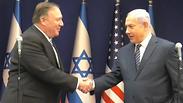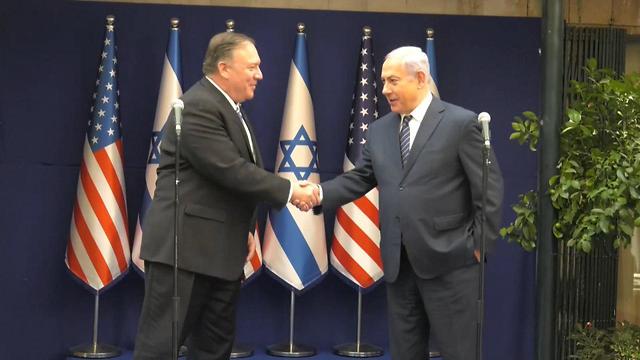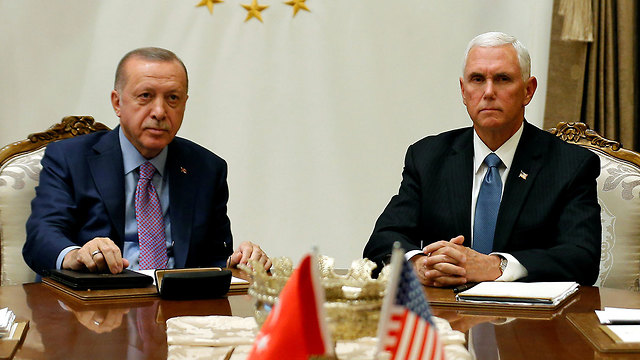
Pompeo and Netanyahu meet as the U.S. seeks to assure Israel focus stays on Iran "threat"
Trump's Syria about-face was the latest in recent decisions that have stirred discomfort within Netanyahu's conservative cabinet, which had previously seen itself and the Trump administration as marching in lockstep
Following the meeting, the secretary described the relationship between the two countries as "strong as it has ever been" adding the two discussed the challenges facing the world, the United States and Israel.

Pompeo said he and Netanyahu discussed "all the efforts we've made to push back against the threat not only to Israel but to the region and the world from the Islamic Republic of Iran."
"We shared our ideas about how we can ensure Middle East stability together, and how we would further our efforts to jointly combat all the challenges that the world confronts here in the Middle East," Pompeo told reporters with Netanyahu by his side.
The secretary underscored U.S.-Israeli efforts to counter Iran in the meeting, in an apparent attempt to ease concerns in Israel that Tehran could exploit a U.S. military pullback in Syria.
Pompeo and Netanyahu met hours after Turkey agreed with the United States to pause its offensive on Kurdish forces in Syria.
Turkey launched its assault against the Kurdish YPG militia in Syria last week after President Donald Trump pulled a U.S. contingent out of the way, creating a new front in Syria's eight-year war and prompting 200,000 civilians to take flight.
Israel sees Syria's Kurds, once U.S. allies, as a counterweight to Islamist insurgents in northern Syria.
It also worries that its arch-foe Iran or local allies could fill the vacuum left by a disengaged United States.
The Kurds responded to the U.S. withdrawal by inviting Syrian government forces, backed by Moscow and Tehran, into towns and cities in areas they control.
Asked for his reaction to the pause in Turkey's offensive, Netanyahu said: "We hope things will turn out for the best."
Thursday's pause, brokered in Ankara by a U.S. team including Pompeo and U.S. Vice President Mike Pence, gives Kurdish forces five days to withdraw from a "safe zone" Ankara had sought to capture.
A spokesman for the Syrian Kurdish forces says a border town remains besieged Friday and is being shelled by Turkey and its allied forces, despite a cease-fire agreement.
Pompeo's visit on the heels of the ceasefire was widely seen in Israel as an attempt to assuage Israeli concerns that a U.S. force drawdown could expose it to attacks by Iran or its proxies.
Officials close to Netanyahu are quick to talk up the Republican president's unprecedentedly pro-Israel policies, such as quitting the Iran nuclear deal and recognizing Jerusalem as the Israeli capital and the Golan Heights as Israeli-annexed.
However, Trump's Syria about-face was the latest in recent steps that have stirred discomfort within Netanyahu's conservative cabinet, which had previously seen itself and the Trump administration as marching in lockstep.
Indeed, Trump's recent diplomatic outreach to Tehran and firing of hawkish National Security Adviser John Bolton have cast a cloud over Netanyahu, who highlighted in two inconclusive Israeli elections this year what he described as his close relationship with Trump.
Amos Harel, military correspondent for the left-wing Haaretz daily, said the muted U.S. reaction to the Sept. 14 attack on Saudi oil facilities and abrupt end in support to Syria's Kurds "forces Israel to rethink its Middle East strategy".
"The American withdrawal raises questions about the extent of Trump's commitment to Israel when push comes to shove," he wrote on Thursday.
The conservative Netanyahu faces a Wednesday deadline to form a government following a deadlocked Sept. 17 contest with his main opponent, former armed forces chief Benny Gantz.
While in Israel, Secretary Pompeo called on the UN Security Council to renew its embargo on weapon sales to Iran that is due to expire next year.
Later on Friday, Pompeo will fly to Brussels for a meeting with NATO Secretary General Jens Stoltenberg.











